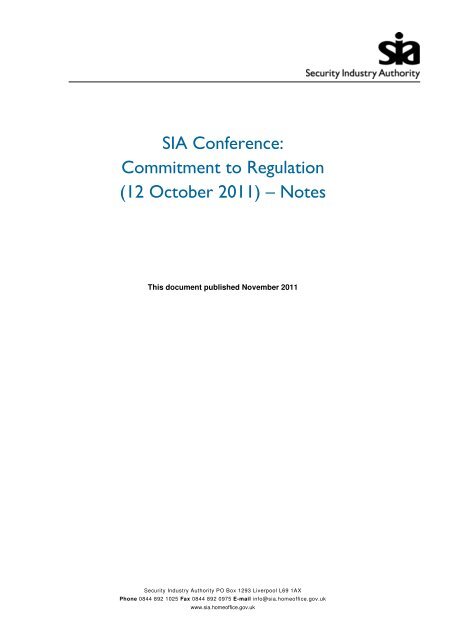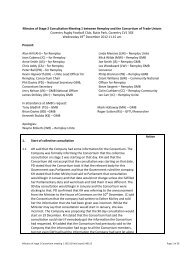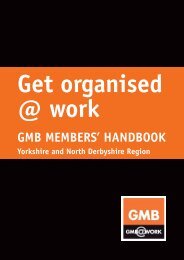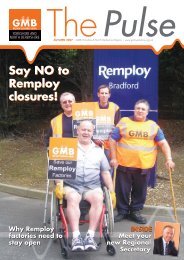notes document - Security Industry Authority
notes document - Security Industry Authority
notes document - Security Industry Authority
You also want an ePaper? Increase the reach of your titles
YUMPU automatically turns print PDFs into web optimized ePapers that Google loves.
SIA Conference:Commitment to Regulation(12 October 2011) – NotesThis <strong>document</strong> published November 2011<strong>Security</strong> <strong>Industry</strong> <strong>Authority</strong> PO Box 1293 Liverpool L69 1AXPhone 0844 892 1025 Fax 0844 892 0975 E-mail info@sia.homeoffice.gov.ukwww.sia.homeoffice.gov.uk
ContentsIntroductionSummary of the DayBreakout SessionsAppendix: List of AttendeesPage 2 of 19
IntroductionNotes from SIA Conference: Commitment to RegulationThese summary <strong>notes</strong> reflect the collated views of those who attended the conference, alist of whom can be found in the appendix.It is acknowledged that each delegate has a different view and does not necessarily agreewith each point, however all views and suggestions have been recorded.It is noted that the ideas and suggestions recorded do not represent agreements, nor dothey represent the view of the SIA. The SIA may disagree or agree with the views andsuggestions of the conference.Page 3 of 19
Summary of the DayDave Humphries, Director of Compliance, Intelligence and Communication welcomeddelegates to the SIA Conference: Commitment to Regulation. Dave stressed theimportance of industry input as we develop plans for the future of regulation for the privatesecurity industry.SIA Chair, Baroness Ruth Henig opened the conference with a speech to delegates. Ruthoutlined the achievements of the SIA so far – such as compliance and enforcement activityand excluding unfit individuals from the industry, and the success of the ApprovedContractor Scheme – and gave an overview of intentions for the future. The full speech isavailable on our website.Website link:• www.sia.homeoffice.gov.uk/conferenceFollowing Ruth’s speech Home Office Minister Lynne Featherstone reinforced Ruth’scomments in a video message and said that the conference presented "a fantasticopportunity for you, the members of the private security industry, to come together todiscuss the challenges, and contribute to the shaping of, the future of, your industry”.An overview of plans for the transition was delivered by Hazel Russell, SIA Director ofTransition, in her presentation 'SIA Proposals for the Future'. She explained the keycomponents of future regulation: a new regulatory body outside government, the licensingof businesses, and a register of individuals who are fit and proper to work in the privatesecurity industry, underpinned by effective compliance and enforcement.Website link:• www.sia.homeoffice.gov.uk/conferenceStephen McCormick, SIA Director of Service Delivery, then spoke on 'Designing ServicesFit for the Future'. He said that with future regulation being developed to be businessfocussed and to achieve reduced burden and cost, there would need to be changes andimprovements to service delivery. He described current plans to continue to improve thelicensing and customer service, such as website improvements, a better bulk applicationprocess, and electronic contact and payment methods.Website link:• www.sia.homeoffice.gov.uk/conferenceJames Kelly, Chief Executive of the British <strong>Security</strong> <strong>Industry</strong> Association (BSIA) andChairman of the <strong>Security</strong> Regulation Alliance, introduced the <strong>Security</strong> Alliance’s new namethe <strong>Security</strong> Regulation Alliance to the conference. He talked about the history of the<strong>Security</strong> Regulation Alliance, the aims and objectives of the Alliance, the members andtheir strategic principles. James told delegates about the progress the Alliance has made todate and what it hopes to achieve in the future.Alastair Thomas, CCTV Policy Lead, Home Office, discussed surveillance camera systemsand the regulation affecting the surveillance camera systems. Alastair discussed the needfor regulation and what regulation is proposed for the future.Ian Thomas, Head of <strong>Security</strong> and Resilience at the London Organising Committee forOlympic Games (LOCOG), discussed security requirements for the Olympics andParalympics Games in London 2012. Ian spoke about the key elements of LOCOG'ssecurity strategy.Page 4 of 19
Paul Evans from KPMG, previously Director of Interventions at the Serious and OrganisedCrime Agency (SOCA), discussed organised crime. Paul talked about the diversity oforganised crime, from narcotics to mass marketing fraud initiatives. He also spoke abouttechniques that can be used to tackle organised crime, and how SOCA can share data withother government agencies.Website link:• www.soca.gov.ukBill Butler, Chief Executive of the SIA, closed the conference by thanking the day’sspeakers and drawing out the key messages.Bill highlighted that there was still general support for where the SIA is going but there wassome concern about how and why. Bill told delegates that now – from a position ofstrength, when regulation is working – is the time for regulation and the way the SIAregulates to move on. The risks the industry and the regulator face are significantly differentto those that the regulatory regime was introduced to address in 2001. There is terrorism,technology, there is greater importance for the industry to be reliable in a new environmentwhere the police are dependent on the standards of the industry, and there is a role interms of helping to tackle organised crime. Bill also reflected on Stephen McCormick’sassessment of the current system, the length of time it takes applicants to apply for alicence and the cost of posting the application forms (over £300,000 a year). The biggestchange, Bill told delegates, is that there will no longer be a renewal cycle for licences,which means the number of people who go through the application system will be halved.Bill told delegates that proposed changes are in the interest of the industry: they reducecosts and allow the regulator to focus on standards within the industry.Bill talked about the pace of change this time last year when it was thought that the SIAmight be abolished, and the SIA and the industry did not know what the future of regulationwas going to be. Bill told delegates that the pace of change needs to be measured and theindustry echoed that it must not be rushed. There is now a clear vision for the proposednew regulatory regime. Bill told the conference that although dependent on the legislativetimescale there are things that the SIA can and will seek to do in advance of formallegislation including the modernising of systems for licensing.Bill welcomed colleagues from the Scottish and Northern Ireland governments, who are akey part of the thinking and discussions to date, and encouraged delegates who workacross boundaries in the UK, in Scotland and in Northern Ireland to engage with thegovernments there to make sure their views are reflected in the decisions being made.Bill closed the conference by reflecting on the passion and interest in the industry to getregulation of the private security industry right. Bill encouraged delegates to keep talking tothe SIA and asked delegates to keep talking to their staff. Bill talked about the future ofregulation roadshows that are talking place across the UK. They are designed to keepindividual licence holders informed. He asked delegates to encourage their staff to attendone of these roadshows to allay any uncertainty amongst individuals working in theindustry.Page 5 of 19
Breakout SessionsDelegates were given the opportunity to attend one of two breakout discussion sessions:'ACS and the Future of the Hallmark' or 'Individual Applications: the Challenge forEmployers'.ACS and the Future of the Hallmark'The Approved Contractor Scheme and the Future of the Hallmark' was chaired by ACSAssistant Director Andrew Shephard and Quality Assurance Manager Jody Parker. Theyset out plans for approved contractors to automatically qualify for the new business licence,and for the current Approved Contractor Scheme to continue at least until compulsorybusiness licensing is established. Delegates at the session agreed that the continuation ofa hallmark scheme was crucial, in order to differentiate between the quality mark and thecompulsory business licence. They called for acknowledgement of ACS membership withinbusiness licensing criteria, a continued licence dispensation scheme, and for all publicsector contracts to be awarded to ACS contractors.Delegate comments• As the SIA is leading the debate you may be shaping it where you want it to go. It’sa Catch 22 situation because there's nobody else to lead the debate. The SIA hasto make sure the debate isn't coloured.• I echo the above sentiments. A regulator is responsible for compliance; for aregulator to be involved in raising standards is very unusual and it is likely that theindustry will develop a hallmark scheme. The option of the regulator owning anapproval scheme is not consistent with the Blueprint. Options one and two sitsquarely with lighter touch regulation.• The reason one adopts quality standards is to affect buyer behaviour and is whyclients see ACS as a way of themselves differentiating from the competition. Isgovernment association giving the scheme more client reassurance?• What we mustn't do is lose the ACS or its equivalent altogether. There are 711 ofus in a sector of about 4,000 companies and if we lose it we will go back to asituation where quality companies are not differentiated. We must maintain theACS but recognise the difficulties and that it is not appropriate for the regulator toown and maintain the scheme.• We work with local authorities; they see the ACS as due diligence and it is built intotenders. With the costs of the business licensing and the ACS, if the ACS ismanaged by a trade association will we then have to pay to join that associationrunning the scheme? British Standards and the regulator could have oversight ofthe scheme to avoid this as it will price out many ACS members if they have to payto be part of an association as well.• The business licensing criteria should be set at a level beneath the ACS level. Arewe going to end up with two costs (business licensing and the ACS)? It could be abackward step for companies.• The Scottish public sector are keen to work together to get accreditation for theindustry and are working with the Association of British Insurers to drive costs downfor compliant companies.Page 6 of 19
• The key thing for an ACS-type scheme is that it has the ability to encompass thetechnological side of the industry, such as access control systems. We would bemissing a trick to stick to just licensable manned guarding. The scope of the ACScould/should be wider, especially if separated from the regulator.• I fully endorse the above comment; include the legal use of CCTV under the DataProtection Act. The reputation of CCTV is low and is a dead cert to win there.• Financial aspects of a company need more investigation, part of the businesslicensing not the ACS. It’s not always about how much something costs but aboutrisk and protection.• The development of all members of staff (including back office staff) and all of theindustry need to be involved in a voluntary standards scheme.• I work in training and the night time economy, how far do you go with microbusinesses and business licensing? Do local pubs with one doorman have to havea licence? I think there may be a big loophole created, especially in the south westwhere the current rules are not always understood.• The definition of a security operative needs to be very clear.• All UK public sector contracts should be linked to the ACS (not just in Scotland),the regulator needs to help push on this and it will be even more important oncebusiness licensing is in place.• In 12-14 years the margin pressures have not changed: the big companies canundercut on price due to economies of scale and the non-compliant companieswith no overheads can undercut on price.• What do we want from the hallmark? The Merlin (DWP) standard is about whatqualifications you can provide.• The hallmark has more of a requirement when business licensing is in place asthere is the potential for approval to be devalued with lots of companies with lessthan 10 employees operating as a group.• The Scottish Government policy is to require ACS approval for all public sectorcontracts. Without it there is no ability to differentiate. In the new regulatory regimewith business licensing criteria comparable to that of the ACS there could be afuture situation where government contracts then ask for business licensing notACS. It may or may not be the case.• Some say that there is a possible reduction in standards with business licensingbut companies should take reassurance that that's not the case.• The <strong>Security</strong> Alliance may have a role in coming forward to take a view or a role inthe future of the scheme. It is for the industry not the regulator to take this forward,and the ACS Strategy & Standards Group could merge with an industry group.Questions1. Will there be a period where business licensing and ACS accreditation are bothneeded and paid for? Is the cost of both more or less than the current costs?This depends on the costs of the business licensing scheme. Direct costs should be less,the whole regime is open to consultation and it is up to the industry not the regulator on thefuture of the voluntary ACS scheme and whether you want or need it.Page 7 of 19
2. Is business licensing going to be subject to a company audit?If the requirement for business licensing is conformance to British Standards then you willhave to have a BS certificate and therefore an audit. The ACS already incorporates thesestandards; for those who are not an approved contractor that would be extra and it isanother cost benefit of having the ACS accreditation.3. Will security consultancy services be subject to business licensing and will theybe able to become an approved contractor?It will depend on whether there is a market for those services but there are currently noplans to introduce regulation to new sectors before the new regulatory regime is in place.4. What will be the motivation for businesses to join the ACS if they are a licensedbusiness?It may be that you would like ACS membership to reduce the costs of business licensing.That could be a benefit, that you get concessions in relation to compliance and businesslicensing costs.5. Property management companies such as CBRE need to be involved because theyalso have staff who do security roles, such as caretakers, concierge, andreceptionists.The question is whether they are undertaking licensable roles, if so business licensing willbe applicable. We are highly dependent on intelligence from the industry; compliance willbe one of our biggest challenges with business licensing.6. Why hasn't the rest of the UK taken Scotland's lead to insist on ACS approval forall public sector contracts?I would recommend taking that question to your MP.Page 8 of 19
Individual Applications: The Challenge for Employers'Individual Applications, the Challenge for Employers' was delivered by Assistant Director ofCustomer Service and Quality Improvement Christy Hopkins. He explained that individualapplications would be primarily the responsibility of businesses, with applications submittedthrough an employer or Mediated Access Partner, being e-enabled to ensure reducedburden and duplication. Applications would only be for new entrants, renewals would bereplaced by a regular subscription, and a revocation and suspension process would remainin place. In feedback, delegates stressed the importance of maintaining public safetythrough regular criminal record checks. They also said that as plans developed they wouldwant clarification on how the qualifications upload and checking process would work.Questions1. Where do criminality checks sit within this process, as there will be no renewal,how will the criminality of those renewing be checked?The criminality check would be something the regulator would do. Our planning assumptionis that the Criminal Records Bureau (CRB), Access Northern Ireland and DisclosureScotland would have continuous updates, the regulator would check the criminal record onapplication and if it changes that information will be provided back to the regulator. Thereason we have the renewal cycle currently is because we needed a structure that allowsus to check someone’s criminal record formally at reasonable periods.2. Are there any plans in place for future regulation of the electronics industry?Our plan is not to extend the scope of regulation to new sectors at this time. There are noplans at present to extend into new sectors or new activities.3. Will the cost of the initial application reduce in relation to the annual currentcosts?We can make no commitments about costs because we are not yet at that level of detail.Currently we have an application fee that is set at £245 that applicants pay whether grantedor refused. In the future we are talking about splitting the fee into an application fee and asubscription fee. All applicants would pay the application fee whether their application isgranted or refused. Applicants who have had their application granted would then need topay the subscription fee, and pay the subscription fee on an ongoing twelve month basis.Because we are splitting the costs down the expectation is that the initial application feewould be less than £245 but that has to be modelled.4. Has any thought been given to the training and investment costs for the MediatedAccess Partners (MAPs)?We are currently working with potential MAPs. This is at quite an early stage but qualityassurance is very much a part of the work we doing. We have to understand the costs:there will be development costs that need to be absorbed and we expect there will be atransaction cost. It is yet to be determined whether all the transaction cost or part of it willbe paid by the individual or to what extent the regulator would pay. That’s the kind ofassessment we need to make.5a. How many MAPs are you anticipating there being?Initially one. We are currently undertaking work on who the initial MAP could be, and thenwe would like to get to the point of a pilot or trial. Once we have run that trial we need toreview whether we need to extend mediated access to other providers.Page 9 of 19
5b. Is that the Post Office?The Post Office is one of the organisations we are talking to at the moment, but there are arange of potential providers. We are assessing what our requirements are and what each ofthose organisations can provide.6a. Are individuals still going to be expected to complete an accredited qualificationin the future?Yes, individuals will have to demonstrate competence by completing an accreditedqualification.6b. How will that process [of verifying qualifications] be managed between AwardingOrganisations and either the regulator or the Mediated Access Partner, there is a riskbecause certificates can be forged?Currently, when an application comes through to us, one of the checks we do is that theindividual has the qualification. The applicant enters the information on the application formbut we do not rely solely on that information, we verify their qualification by checking on thequalifications database. Our planning assumption is that this would be one of the initialchecks the company or MAP would carry out. The change will be bringing access to thequalifications database further down the process chain. What the awarding organisationsdo will not change, it is who is checking the database that changes.7. There is going to be a burden or a cost shift to businesses, and the MAP won’t beregistering the individual without a fee. Will consideration be given to the cost of theinitial registration being significantly reduced to take account of that factor?Our commitment is that the overall burden remains at the least the same or is reduced interms of the whole of regulation. I have discussed duplication in the current system; byremoving that duplication we can reduce burden. In terms of mediated access there will bea transaction cost, which in theory could be paid by the individual to the MAP, what we’relooking at is to what extent the regulator would be able to absorb some or all of thattransaction cost. It has be considered in a business case but we are not making animmediate assumption that that cost will be borne entirely by the individual. One of the keydrivers for these changes is about reducing the amount of processing the regulator is doingand the amount of cost incurred by the regulator. We believe all of the improvements thatwe’re describing today take cost out of the application process, and because we are a costneutral organisation that cost saving will be passed on, where we can, to the industry.8. With the current process the licence has been issued on the basis that all thecriteria have been met; we only employ someone if they have a licence. Would theemployer be required to carry out checks at the application stage? I can understandif it is a brand new employee but if it is a subscription would we need to carry out thechecks?The expectation is that for those licensed at the point that we cut over to the individualregistration their existing licence would passport into that arrangement and that only whenthey reach the point of expiry of that licence will they drop into the subscription model. Wewill have already done, as the regulator, those checks for that individual and in effect theywill then be subject to the ongoing checks that anyone registered in the future regime willbe subject to. The five year point I mentioned in my presentation would be to update thephotograph and re-issue the token. We will still be running our revocation, suspension andintelligence gathering processes.9. You are pushing a huge amount of the administrative work and checks on to thebusinesses so the cost of the licensing process to businesses is not just the chequethat they write to you but also the cost of what they are doing in-house. One thingyou might want to think of doing is if there is a cost that the MAPs that you use thatPage 10 of 19
as a proxy for the amount of cost that is going to be pushed to businesses and usethat to work out what the actual cost for this process will be for businesses in thenew regime.We have a piece of work to do about the impact and the burden on businesses. Somebusinesses in the current regime already vet their employees and they are paying the SIAto duplicate those checks. Licensed businesses will have to prove they are a fit and properbusiness and able to carry out those checks. We will be able to remove the ability toprocess individual applications from businesses so it will be possible to continue to bebusiness licensed without having the ability to register your employees.10. I am concerned about how easy it is to forge <strong>document</strong>s. How are you going tomaintain a standard for checking identity <strong>document</strong>s amongst businesses andMAPs?We are not removing the regulator’s ability to verify identity <strong>document</strong>s, what we are sayingis that identity <strong>document</strong>s will be verified by the regulator on a risk assessed basis. I acceptthe fact that our risk assessment has to be spot on to get that right. The easy option wouldbe for everything to come to the regulator, but that costs a lot. The vast majority ofapplicants do not submit fraudulent <strong>document</strong>ation. The regulator will retain its capacity tocheck <strong>document</strong>s, where there is a risk we can take in physical <strong>document</strong>s to verify them,but we will not do this for everyone. The work we are undertaking with potential MediatedAccess Partners involves ensuring they have the hardware to check the validity of<strong>document</strong>s; we expect this to be built into the solution.11. Are we talking about the point of the Private <strong>Security</strong> <strong>Industry</strong> Act 2001 whichwas to improve public safety or are we talking about managing the expectations ofcosts?The key objective of the regulator stays the same. The reason we are here is publicprotection, and fundamentally the aim is still the same but the challenges and risks havechanged. We think the way we can meet that objective can be done in a better way.12. I work for an organisation that employs 650 part-time security staff. They all workfor another employer but work for us on specific events. Are we going to beexpected to become one of your 4,000 licensed businesses and be responsible forthose employees, or will that revert back to their other employers?We understand that a key feature of this industry is that people work for multiple employersand sometimes in multiple sectors; as such we want to create a solution that allowsindividuals to be linked to multiple businesses, potentially 'primary employers' and'secondary employers'. It needs to be resolved as to who is responsible for processing thatindividual: we accept that it is an issue. We would expect employers to maintain links toindividuals they employ.13. The individual would be passing their responsibility for keeping their record up todate to the employer; in this type of situation it seems the individual should bekeeping the register up to date.We are not saying that there will not be the potential for the individual to update theregister. However, an individual will work for the majority of the time, or considerthemselves to be primarily employed by, one company. I would expect in that situation thatthey would want the link to be with that employer. If they work for other employers on apart-time basis it does not mean that those companies would have to maintain the registeron behalf of that individual, because that interaction would still exist with the mainemployer. This is a level of detail that we need to work out in terms of multiple links tomultiple employers.Page 11 of 19
14. If an individual is banned or suspended all the companies that individual worksfor should be made aware.The employer would choose to link themselves to that individual. We are not changing thefact that the responsibility remains with the company that deploys that individual to checkthe register and satisfy themselves that the individual has a valid licence and is able towork.15. If an individual does not have an employer or doesn’t trust the Mediated AccessPartner there is no alternative method for them to apply as an individual; it is forcingthem to use the MAP.The employer and the Mediated Access Partner are the only two application routesavailable to a new individual applicant.16. Most applicants for a security role have a licence; the vast majority are notasking for a job and then applying for a licence.This is why we understand the need to have that mediated access provision. We expectthat the vast majority of applications will go through businesses. We do not think it is costeffective for the regulator to maintain the licence application process for what is a relativelysmall number when there is the MAP route.17. Will private security companies become MAPs?Initially, we will have one supplier as the national Mediated Access Partner. Something wehave considered is other groups becoming MAPs and originally we thought aboutbusinesses choosing to process applications on behalf of people they do not employ. That’sa potential, an opportunity, but we need to look at its viability in the future.18. Will you reduce burden and bureaucracy on training providers in terms oftraining providers checking the individuals’ identification <strong>document</strong>s?There is a question we need to ask about the level of assurance the checks give comparedto the burden. We have three points of identity verification when the application is beingprocessed, which gives a significant level of assurance. We are currently looking at whetherthis is over assurance, and if it is required. It is a question in play for us, but we need to besure risk is not increased.19. Why couldn’t training providers do the job of individual registration or awardingorganisations, and reduce burden on businesses?When working on the mediated access provision we looked at the range of options,including training providers. They are still on the list of potential MAPs, they have not beendiscounted. We decided to choose a national network because we want to move quickly totest whether the MAP provision is viable but we certainly haven’t ruled out the possibility ofopening up to other types of organisation or business, particularly where there is an overlapwith the current process.20. There is a transient population in the security industry; people move on veryquickly. I think it’s unrealistic for you to expect businesses to keep a check on themovements of staff. The businesses will register people and only a small proportionof people that will stay with one employer.We do not think it is an excessive burden for business because we expect private securitybusinesses to keep up to date with their employees’ movements and addresses. Once anemployee moves away from that business, either out of the industry or to another business,then it is for the employer to break the link between them and the employee. While in theemploy of that business it is reasonable that the employer maintains the records.Page 12 of 19
21. One of the characteristics you get in the industry is the bulk transfer ofemployees from one employer to another if contracts end. Have you given anyconsideration to that gap between employers and what might happen to theindividual?We have not thought about that yet, this is the detail we need to get into next. What wehave been working on this week is how the payment structure would work for ongoingsubscription payments in steady state, and working out who is responsible for thatpayment, for example is it easier for it to be the employer or easier for it to be theindividual?22. A criminal conviction during the three year renewal cycle of the licence is notchecked during the three years you have the licence, currently the renewal systemonly picks up convictions on renewal.The ongoing subscription would not work unless we had continuous update from theCriminal Records Bureau (CRB), Access Northern Ireland and Disclosure Scotland. Thekey here is that we have a three year cycle for exactly the reason you described, so wehave a point at which we can check. The continuous criminality updating would ensure thatonce the check has been done at the point of application, if it changes we get thatinformation pushed straight to us. With that process the ongoing subscription can work andwould provide much better information than we can now, we would not be reliant onintelligence or the individual telling us about their criminal history.23. Some smaller door supervision companies may go out of businesses becausedoor supervisors decide to go self-employed and work straight to the bar or clubowner.There is a view that the prevalence of the self-employment status is rife in the doorsupervision sector already, and there are questions as to what extent that is appropriate.This is one area we think business licensing will assist with, we are helping to ensure thatthose that should be formally employed are and the self-employment status isn’t abused. Itis worth noting that if a door supervisor is self-employed, they still need to hold an SIAlicence.24. It seems like you are re-inventing the wheel, the system you have for individualsat the moment works.We feel that we have a system that broadly works but there are flaws. The industrycontinues to evolve and the risks and issues change over time. If we stayed the same wewould end up going backwards. What we have to do is re-align ourselves to meet theongoing risks while not pretending that we can keep loading burden on the industry.Business registration is the way forward but what we have to do is put the responsibility onthe businesses to take responsibility for individual registration.25. What’s going to happen to licensed premises who employ door supervisors, it’squite complicated and legislated at the moment?There are no plans to change that.Page 13 of 19
Appendix: List of AttendeesCompanyA19 SkillsA19 SkillsAbbey <strong>Security</strong> Services LtdAccess Training (South West) LtdAccess Training (South West) LtdACPOSAdvance <strong>Security</strong>Advance <strong>Security</strong>Advance <strong>Security</strong>Advance <strong>Security</strong>Advance <strong>Security</strong>Advance <strong>Security</strong>Advance <strong>Security</strong>Aim AwardsAim AwardsAim AwardsAkita <strong>Security</strong>BIIABBillcroft AssociatesBKS <strong>Security</strong>Broadland Guarding Services LtdBSIABuckinghamshire New UniversityNameAlex O'BrienChris O'BrienPauline Whitaker-BethelNatasha MichellGerald BanksJackie GilfillanRichard BaileyChris FieldhouseDavid MarchioTony AmorStuart WrightMark GrantDonna AlexanderLinda WyattDeborah MarshJackie ElliotPhilip WilliamsCathie SmithAlan EcclesBryan MaddernFrank AdamsonJames KellyAngela Vernon-LawsonPage 14 of 19
CompanyC.UK <strong>Security</strong> ServicesCamerawatchCapricorn <strong>Security</strong>Cardinal <strong>Security</strong>Cardinal <strong>Security</strong>Cardinal <strong>Security</strong>CEOPCharnwood Training GroupCharnwood Training GroupCole <strong>Security</strong> Services LtdConstant <strong>Security</strong> ServicesDepartment of Justice Northern IrelandDepartment of Justice Northern IrelandDoyle ConsultantsDoyle ConsultantsEdexcelEDIEDIG4S Cash SolutionsG4S Cash SolutionsG4S Secure SolutionsG4S Secure SolutionsGMBGriffin Protective Solutions UK LtdGSL DardanNameRog HatlemPaul MackieWilliam RobinsonAmy MetcalfeDebbie BurrowsBryn TaylorPeter DaviesMichael BoultonTom BoultonAnthony CritchleySarah LeeClare BradySteven McCourtPaula DuckerTracy CraftJoe ButlerCaroline SmithPeter KirkhamRobert BrassingtonJoy SewellDeborah McCabeDonna AllanDave GiggGraham StanleyMark DuffyPage 15 of 19
CompanyGuarding UK LtdHighfield Awarding Body for ComplianceHighfield Awarding Body for ComplianceHome OfficeHome OfficeHome OfficeHome OfficeHome Office (Drug and Alcohol)ICTS UK ltdIndependent Contractor <strong>Security</strong> LtdIndependent Contractor <strong>Security</strong> LtdInfologueInformation Commissioner's OfficeInformation Commissioner's OfficeInterrInterrIPSAISOQARIzon <strong>Security</strong> LtdIzon <strong>Security</strong> LtdJomu LtdJS Facilities Group LtdJS Facilities Group LtdKey <strong>Security</strong> (UK) LtdKPMGNamePeter ReesJason SprengerChris DanielWill GrantJohn CairncrossKate MosleyAlastair ThomasAndrew ParsonsCharlie CleverlyTony CockcroftFay CarguilloBobby LogueMichele HarmerJudith JonesWayne TaitTerry BurtonJustin BentleySteve StubleyPaul CameronCharles MillarGillian JonesJon SchofieldJohn SearchKieran MontgomeryPaul EvansPage 16 of 19
CompanyLaser Learning AwardsLegion <strong>Security</strong>LOCOGMorning AdvertiserMunnelly <strong>Security</strong> ServicesNational DoorwatchNational Open College NetworkNational Open College NetworkNEC GroupNSINSINSL LtdOCS Group UK LtdOCS Group UK LtdOptimum <strong>Security</strong> LtdPD PortsPDM Training and ConsultancyPerpetuity Research & Consultancy InternationalLtdPost Office Ltd Cash ServicesPost Office Ltd Cash ServicesPost Office Ltd Cash ServicesPost Office Ltd Cash ServicesRemployResource (United Kingdom) LimitedRugby Football UnionNameSteve BabbidgeEmma WiseIan ThomasTony HalsteadGary McPartlandIan FoxDavid HutchinsonDavid MitchellGary MastersKay AitkinJeffrey LittleKenneth HanslipShaun CowlanHoward AustinVictor OleksandrenkoDenis MurphyKerry ThompsonCharlotte LawsonKeith HendersonTracy BondPhilip FurnessMarcia BourneRichard WilliamsAndie FesseyAlex DunnPage 17 of 19
CompanySecuritas <strong>Security</strong> ServicesSecuritas <strong>Security</strong> Services<strong>Security</strong> Management TodaySheffield International Venues LtdSheffield International Venues LtdShergroup <strong>Security</strong>SIASIASIASIASIASIASIASIASIASIASIASIASIASIASIASIASIASkills for <strong>Security</strong>SodexoNameStephen BeavenJohn TurnerBrian SimsRachael PyecroftAndy BridgerChris BellBill ButlerRuth HenigBill MatthewsRobin DahlbergLinda SharpeHazel RussellStephen McCormickDave HumphriesRobert BuxtonAndrew ShephardChristy HopkinsSiana BrethertonElizabeth AshleyAmy CopeJody ParkerCassie HoweImogen HayatDavid GreerJane FarrellPage 18 of 19
CompanySPS <strong>Security</strong> LtdSPS <strong>Security</strong> LtdSSAIBSTM <strong>Security</strong>Strathclyde PoliceStrathclyde PoliceTavcom TrainingThe Protector Group LtdThe Scottish ExecutiveThe <strong>Security</strong> InstituteThe <strong>Security</strong> WatchdogThe Wellcome TrustThreshold <strong>Security</strong> LtdTurner Facilities ManagementUniversity of Plymouth Students UnionUniversity of SheffieldValley WatchVSGWalford <strong>Security</strong> LtdWorld Association of Professional InvestigatorsWorld Association of Professional InvestigatorsNameJames SmedleyDavid BannisterLynn Watts-PlumpkinTerry KetleyDC Paulette KupschDS Gillian GardnerKevin MatthewDerrick HalliwellJohn NicholsonNick EvansLynda MooreDawn WiseRichard NewmanGeorge JenkinDean ToneyAlastair WilsonCyril DeemingCarolyn MurdinRon BlakeTony SmithBeverly FlynnPage 19 of 19
















